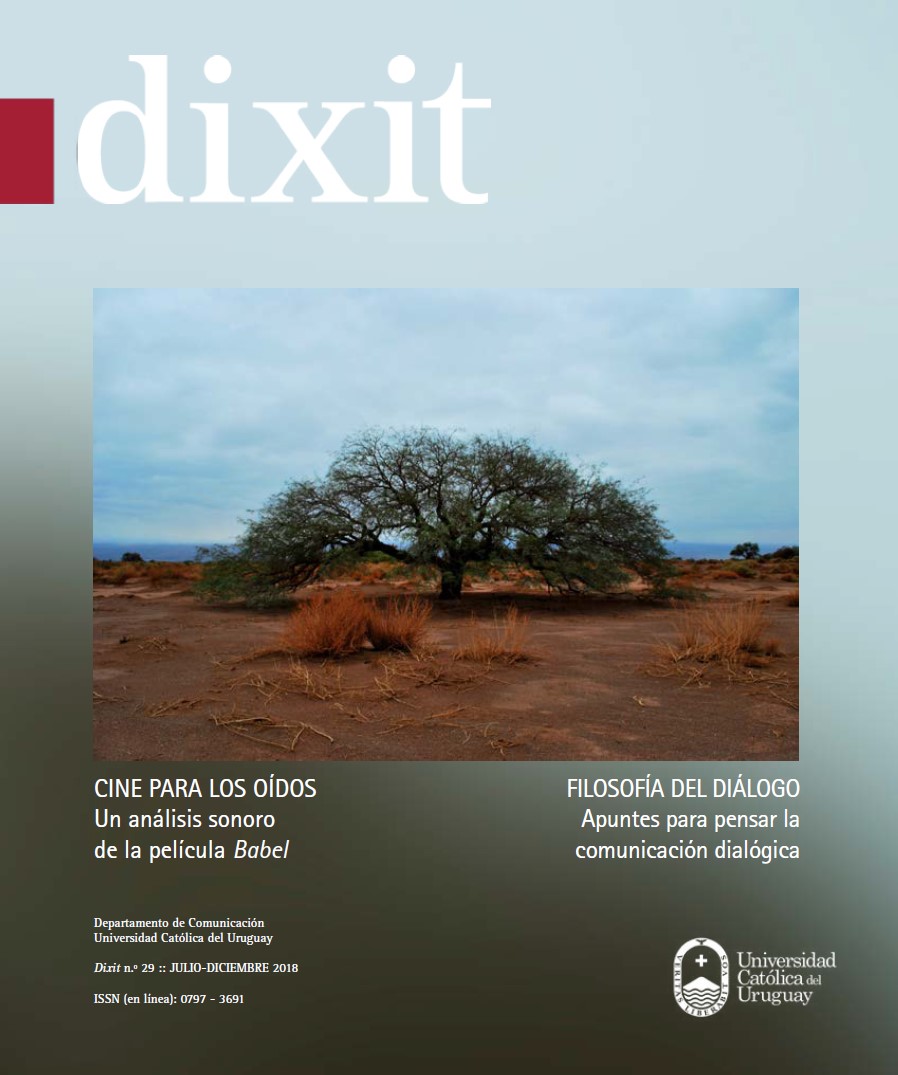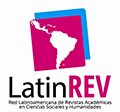The meanings and interpretations of the self: A multidimensional analysis
DOI:
https://doi.org/10.22235/d.v0i29.1695Keywords:
self, identity, essence, existence, narrativeAbstract
The aim of this paper is to explore the different meanings given to the notion of the self. In this sense, and to know this process in depth, a review of the state of the art has been carried out and it has been delimited that there are four theoretical perspectives: the essentialist or interior vision; the existentialist or exterior vision; the absence or the denial vision; and the narrative or interpretative vision. In order to know and interpret the different epistemological traditions, the four proposed approaches have been developed succinctly. In the light of the proposed analysis, it can be concluded that these perspectives are not axiomatic and that should be studied in a complementary manner, that it is necessary to build bridges between disciplines and that different interpretations should not be treated in an exclusionary manner, but in a necessary dialogue or co-implication.
Downloads
References
Allport, G. (1937). Personality: A Psychological Interpretation. Nueva York, NY: Holt.
Arreaza, C., y Tickner, A. B. (2002). Postmodernismo, postcolonialismo y feminismo: Manual para (in)expertos. Colombia Internacional, 54, 14-98.
Bamberg, M. (2011). Who am I? Narration and its contribution to self and identity. Theory and Pshychology, 21(1), 3-24.
Bauman, Z. (2003). Modernidad líquida. Buenos Aires, Argentina: Fondo de Cultura Económica.
Beck, U. (2006). La sociedad del riesgo: hacia una nueva modernidad. Madrid, España: Paidós.
Boutinet, J. P. (1999). Traité de sciences et techniques de la formation. París, Francia: Editions Dunod.
Bühler, P., y Habermacher, J. F. (1988). L’identité narrative. En La narration. Quand le récit devient communication (pp. 278-300). Ginebra, Suiza: Les Editions Labor et Fides.
Burke, P. J. (2004a). Identities, Events and Moods. En J. C. Turner (Ed.), Advances in Group Processes (pp. 25-49). Greenwich, CT: JAI Press.
Burke, P. J. (2004b). Identities and Social Structures: The 2003 Cooley-Mead Award Address. Social Psychology Quarterly, 67(1), 5-15.
Canning, K. (1994). Contesting the Power of Categories: Discourse, Experience, and Feminist Resistance. Signs: Journal of Women in Culture and Society, 19(2), 368-404.
Carreras, A. y Linares, J. L. (2006). Diálogos sobre personalidad, identidad y narrativa. Revista Redes, 16, 83-95.
Chambers, I. (1994). Migración, cultura, identidad. Buenos Aires, Argentina: Amorrortu.
Cooley, C. H. (1902). Human Nature and Social Order. Nueva York, NY: Scribner.
De Beauvoir, S. (1960). The second sex. Londres, inglaterra: Four Square Books.
Deleuze, G. (1991). Postdata sobre las sociedades de control. En C. Ferrer (Comp.), El lenguaje libertario (pp. 115-122). La Plata, Argentina: Terramar.
Descartes, R. (1970). Meditaciones metafísicas. Buenos Aires, Argentina: Aguilar.
Duch, L. (1974). Ciencia de la religión y mito. Estudios sobre la interpretación del mito. Barcelona, España: Abadía de Monserrat.
Duch, L. (1978). Historia y estructuras religiosas. Barcelona, España: Don Bosco.
Duch, L. (1984). Religió i món modern. Introducció a l’estudi dels fenòmens religiosos. Barcelona, España: Abadía de Monserrat.
Duch, L. (2002). Mito, interpretación y cultura. Barcelona, España: Herder.
Esteva Fabregat, C. (1993). Cultura, sociedad y personalidad. Barcelona, España: Anthropos.
Fernandez-Zoïla, A. (1999). Récits de vie et crises d’existence. París, Francia: L’Harmattan.
Ferrater Mora, J. (1973). Diccionario de Filosofía. Buenos Aires, Argentina: Editorial Sudamérica.
Foucault, M. (1992). Vigilar y castigar. Madrid, España: Siglo XXI.
Fraser, N. (1989). Unruly Practices: Power, Discourse, and Gender in Contemporary Social Theory. Minneapolis, MN: University of Minnesota Press.
Fredric, J., y Zizek, S. (1998). Estudios culturales. Reflexiones sobre el multiculturalismo. Buenos Aires, Argentina: Paidós.
Freud, S. (1979). La interpretación de los sueños. Madrid, España: Alianza.
Freud, S. (1999). La identificación. En Obras completas. Vol. 18 (pp. 99-115). Buenos Aires, Argentina: Amorrortu.
Freud, S. (2000a). Psicología de las masas. Madrid, España: Alianza.
Freud, S. (2000b). Lo inconsciente. En Obras completas. Vol. 14 (pp. 153-201). Buenos Aires, Argentina: Amorrortu.
Freud, S. (2009). El yo y el ello y otros escritos de metapsicología. Madrid, España: Alianza.
Fuss, D. (1989). Essentially Speaking. Nueva York, NY: Routledge.
Gergen, K. J. (1996). Realidades y relaciones. Aproximaciones a la construcción social. Barcelona, España: Paidós.
Giddens, A. (1995). Modernidad e identidad del yo. El yo y la sociedad en la época contemporánea. Barcelona, España: Editorial Península.
Gilroy, P. (1998). Los estudios culturales británicos y las trampas de la identidad. En J. Curran, D. Morley, y V. Walkerdine (Comps.), Estudios culturales y comunicación. Análisis, producción y consumo cultural de las políticas de identidad y el posmodernismo (pp. 63-84). Barcelona, España: Paidós.
Habermas, J. (1988). La lógica de las ciencias sociales. Madrid, España: Tecnos.
Hall, S., y Du Gay, P. (Comps.). (2003). Cuestiones de identidad cultural. Buenos Aires, Argentina: Amorrortu.
Han, B. C. (2010). La sociedad del cansancio. Barcelona, España: Herder.
Haraway, D. J. (1985). Manifesto for Cyborgs: Science, Technology, and Socialist Feminism in the 1980s. Socialist Review, 80, 65-108.
Haraway, D. J. (1990). Simians, Cyborgs and Women. Londres, Inglaterra: Association Books.
Haraway, D. J. (1995). Ciencia, cyborgs y mujeres: La reinvención de la naturaleza. Madrid, España: Cátedra.
Harding, S. (2000). Gender, Development, and Post-Enlightenment Philosophies of Science. En U. Narayan, y S. Harding (Eds.), Decentering the Center. Philosophy for a Multicultural, Postcolnial, and Feminist Wolrd (pp. 240-261). Bloomington, IN: Indiana University Press.
Hebdige, D. (1987). The Impossible Object: Towards a Sociology of the Sublime. New Formations, 1, 47-76.
Hegel, G. W. F. (2015). Fenomenología del espíritu. Valencia, España: Pre-Textos.
Heidegger, M. (2009). Ser y tiempo. Madrid, España: Trotta.
Héritier, F. (1977). L’ identité samo. En C. Lévi-Strauss (Comp.), L’identité (pp. 51-80). París, Francia: Presses Universitaires de France.
Hirschberger, J. (1982). Historia de la Filosofía. Barcelona, España: Herder.
Hobsbawm, E. (1999). L’âge des extrêmes. Histoire du Court XX Siecle 1914-1991. París, Francia: Les Editions Complexe.
Hunt, S. A., Benford, R. D., y Snow, D. (1994). Marcos de acción colectiva y campos de identidad. En E. Laraña, H. Johnson, y J. R. Gusfield (Eds.), Los nuevos movimientos sociales. De la ideología a la identidad (pp. 221-249). Madrid, España: Centro de Investigaciones Sociológicas.
Husserl, E. (1991). La crisis de las ciencias europeas y la fenomenología trascendental. Barcelona, España: Editorial Crítica.
Jung, C. G. (2009). Las relaciones entre el yo y el inconsciente. Barcelona, España: Paidós.
Kant, I. (2002). Fundamentación para una metafísica de las costumbres. Madrid, España: Alianza.
Kerbi, A. P. (1991). Narrative and the Self. Bloomington, IN: Indiana University Press.
Keupp, H., y Höfer, R. (1988). Identitätsarbeit Heute. Klassische und aktuelle Perpektiven der Identitätsforschung. Frankfurt, Alemania: Suhrkamp.
Lifton, R. (1968). Protean Man. Partisan Review, 35(1), 12-27.
Lisón Tolosana, C. (1997). Las máscaras de la identidad. Claves antropológicas. Barcelona, España: Ariel.
Lévi-Strauss, C. (1964). El Pensamiento salvaje. Madrid, España: Fondo de Cultura Económica.
Maalouf, A. (2004). Las identidades asesinas. Madrid, España: Alianza.
Maturana, H., y Varela, F. (1973). De máquinas y seres vivos. Santiago de Chile, Chile: Editorial Universitaria.
Mauss, M. (1979). Sociología y antropología. Madrid, España: Tecnos.
Mead, G. H. (1982). Espíritu, persona y sociedad desde el punto e vista del conductismo social. Barcelona, España: Paidós.
McRobbie, A. (1992). Postmarxism and Cultural Studies: A Postscript. En L. Grossberg, C. Nelson, P. Treichler (Comps.), Cultural Studies: A Reader (pp. 719-730). New York, NY: Routledge.
Murray, H. (1938). Explorations in personality. Nueva York, NY: Oxford University Press.
Ortega y Gasset, J. (1941). Historia como sistema y otros ensayos de Filosofía. Madrid, España: Alianza.
Prat, J. (2007). Los sentidos de la vida. La construcción del sujeto, modelos del yo e identidad. Barcelona, España: Ediciones Bellaterra.
Ricoeur, P. (1965). Réflexion: Une archéologie du sujet. En De l’interpretation. Essai sur Freud (pp. 407-442). París, Francia: Editions du Seuil.
Ricoeur, P. (1980). La metáfora viva. Madrid, España: Editorial Trotta.
Ricoeur, P. (1996). Sí mismo como otro. Madrid, España: Siglo XXI Editores.
Ricoeur, P. (2007). Tiempo y narración. Configuración del tiempo en el relato histórico. Madrid, España: Siglo XXI Editores.
Riley, D. (1990). Am I That Name?. Basingstoke, Inglaterra: Macmillan.
San Agustín. (2003). Las confesiones. Madrid, España: Akal.
Sartre, J. P. (1989). El ser y la nada. Ensayo de ontología fenomenológica. Madrid, España: Alianza.
Scheler, M. (1935). Sociología del saber. Madrid, España: Revista de Occidente.
Schiebinger, L. (1996). Los usos de la diversidad. Barcelona, España: Paidós.
Schütz, A., y Luckmann, T. (2001). Las estructuras del mundo de la vida. Buenos Aires, Argentina: Amorrortu.
Somers, M. R. (1994). The Narrative Constitution of Identity: A Relational and Network Approach. Theory and Society, 23(5), 605-649.
Stets, J. E., y Burke, P. J. (2000). Identity Theory and Social Identity Theory. Social Psychology Quarterly, 63(3), 224-237.
Stryker, S. (2002). Symbolic Interactionism: A Social Structural Version. Caldwell, NJ: Blackburn Press.
Taylor, C. (1996). Fuentes del yo. La construcción de la identidad moderna. Barcelona, España: Paidós.
Willis, P. (2000). The Ethnographic Imagination. Cambridge, Reino Unido: Polity Press.
Downloads
Published
How to Cite
Issue
Section
License
From issue number 32 onwards all contents are licensed under the Creative Commons Attribution 4.0 International License (CC BY 4.0).
Issues number 29-31 are licensed under the Creative Commons Attribution-NonCommercial 4.0 International License.
The contents corresponding to number 28 and earlier editions are under the Creative Commons Attribution-NonCommercial-ShareAlike 4.0 International License.


















